The Evolution of Science Fiction Literature in the 21st Century
VerifiedAdded on 2022/09/23
|6
|1876
|34
Essay
AI Summary
This essay provides a comprehensive analysis of science fiction literature in the 21st century, exploring its definition, evolution, and key themes. The essay begins by defining science fiction and tracing its historical development, highlighting significant works and the influence of technological advancements and world events. It then examines the genre's evolution in the 20th and 21st centuries, focusing on the rise of dystopian themes, the impact of popular culture, and the emergence of science fiction as a global subculture. The essay further discusses the genre's role in reflecting societal anxieties, inspiring real-world technology, and posing ethical questions related to technological advancements. It concludes by emphasizing the importance of science fiction in encouraging imagination, preventing a dystopian future, and inspiring a better future. The essay references various scholarly sources to support its arguments and provide a deeper understanding of the subject.
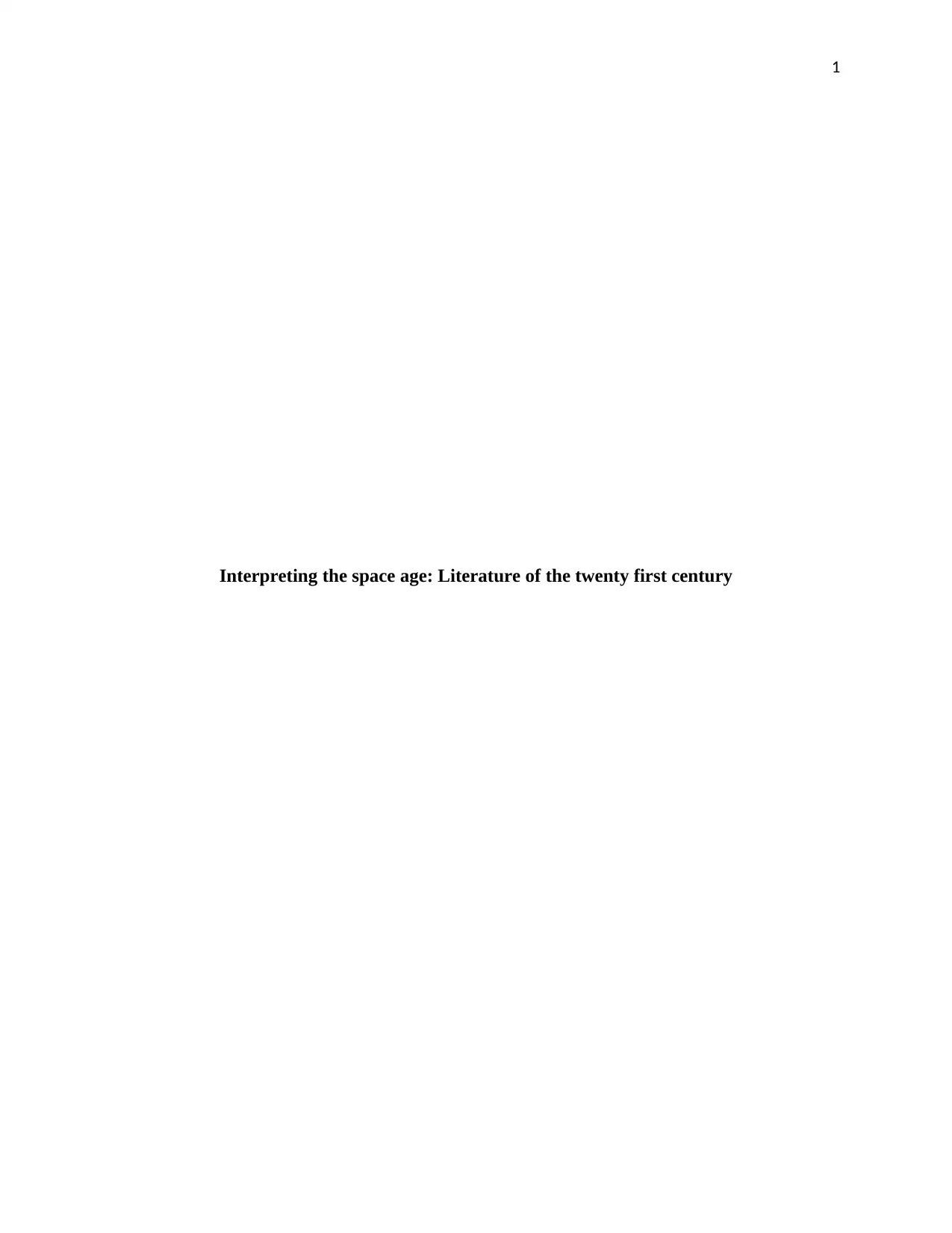
1
Interpreting the space age: Literature of the twenty first century
Interpreting the space age: Literature of the twenty first century
Paraphrase This Document
Need a fresh take? Get an instant paraphrase of this document with our AI Paraphraser
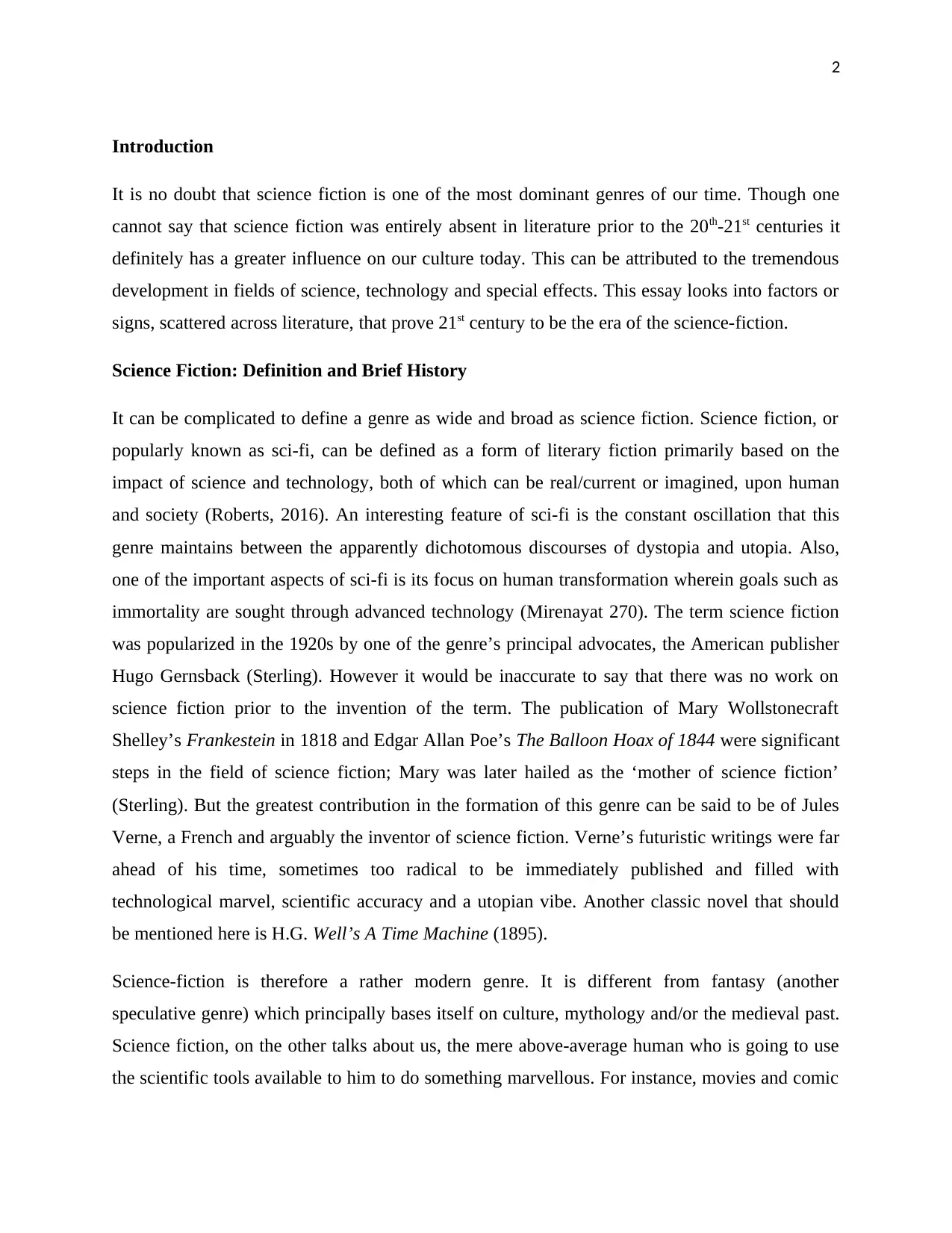
2
Introduction
It is no doubt that science fiction is one of the most dominant genres of our time. Though one
cannot say that science fiction was entirely absent in literature prior to the 20th-21st centuries it
definitely has a greater influence on our culture today. This can be attributed to the tremendous
development in fields of science, technology and special effects. This essay looks into factors or
signs, scattered across literature, that prove 21st century to be the era of the science-fiction.
Science Fiction: Definition and Brief History
It can be complicated to define a genre as wide and broad as science fiction. Science fiction, or
popularly known as sci-fi, can be defined as a form of literary fiction primarily based on the
impact of science and technology, both of which can be real/current or imagined, upon human
and society (Roberts, 2016). An interesting feature of sci-fi is the constant oscillation that this
genre maintains between the apparently dichotomous discourses of dystopia and utopia. Also,
one of the important aspects of sci-fi is its focus on human transformation wherein goals such as
immortality are sought through advanced technology (Mirenayat 270). The term science fiction
was popularized in the 1920s by one of the genre’s principal advocates, the American publisher
Hugo Gernsback (Sterling). However it would be inaccurate to say that there was no work on
science fiction prior to the invention of the term. The publication of Mary Wollstonecraft
Shelley’s Frankestein in 1818 and Edgar Allan Poe’s The Balloon Hoax of 1844 were significant
steps in the field of science fiction; Mary was later hailed as the ‘mother of science fiction’
(Sterling). But the greatest contribution in the formation of this genre can be said to be of Jules
Verne, a French and arguably the inventor of science fiction. Verne’s futuristic writings were far
ahead of his time, sometimes too radical to be immediately published and filled with
technological marvel, scientific accuracy and a utopian vibe. Another classic novel that should
be mentioned here is H.G. Well’s A Time Machine (1895).
Science-fiction is therefore a rather modern genre. It is different from fantasy (another
speculative genre) which principally bases itself on culture, mythology and/or the medieval past.
Science fiction, on the other talks about us, the mere above-average human who is going to use
the scientific tools available to him to do something marvellous. For instance, movies and comic
Introduction
It is no doubt that science fiction is one of the most dominant genres of our time. Though one
cannot say that science fiction was entirely absent in literature prior to the 20th-21st centuries it
definitely has a greater influence on our culture today. This can be attributed to the tremendous
development in fields of science, technology and special effects. This essay looks into factors or
signs, scattered across literature, that prove 21st century to be the era of the science-fiction.
Science Fiction: Definition and Brief History
It can be complicated to define a genre as wide and broad as science fiction. Science fiction, or
popularly known as sci-fi, can be defined as a form of literary fiction primarily based on the
impact of science and technology, both of which can be real/current or imagined, upon human
and society (Roberts, 2016). An interesting feature of sci-fi is the constant oscillation that this
genre maintains between the apparently dichotomous discourses of dystopia and utopia. Also,
one of the important aspects of sci-fi is its focus on human transformation wherein goals such as
immortality are sought through advanced technology (Mirenayat 270). The term science fiction
was popularized in the 1920s by one of the genre’s principal advocates, the American publisher
Hugo Gernsback (Sterling). However it would be inaccurate to say that there was no work on
science fiction prior to the invention of the term. The publication of Mary Wollstonecraft
Shelley’s Frankestein in 1818 and Edgar Allan Poe’s The Balloon Hoax of 1844 were significant
steps in the field of science fiction; Mary was later hailed as the ‘mother of science fiction’
(Sterling). But the greatest contribution in the formation of this genre can be said to be of Jules
Verne, a French and arguably the inventor of science fiction. Verne’s futuristic writings were far
ahead of his time, sometimes too radical to be immediately published and filled with
technological marvel, scientific accuracy and a utopian vibe. Another classic novel that should
be mentioned here is H.G. Well’s A Time Machine (1895).
Science-fiction is therefore a rather modern genre. It is different from fantasy (another
speculative genre) which principally bases itself on culture, mythology and/or the medieval past.
Science fiction, on the other talks about us, the mere above-average human who is going to use
the scientific tools available to him to do something marvellous. For instance, movies and comic
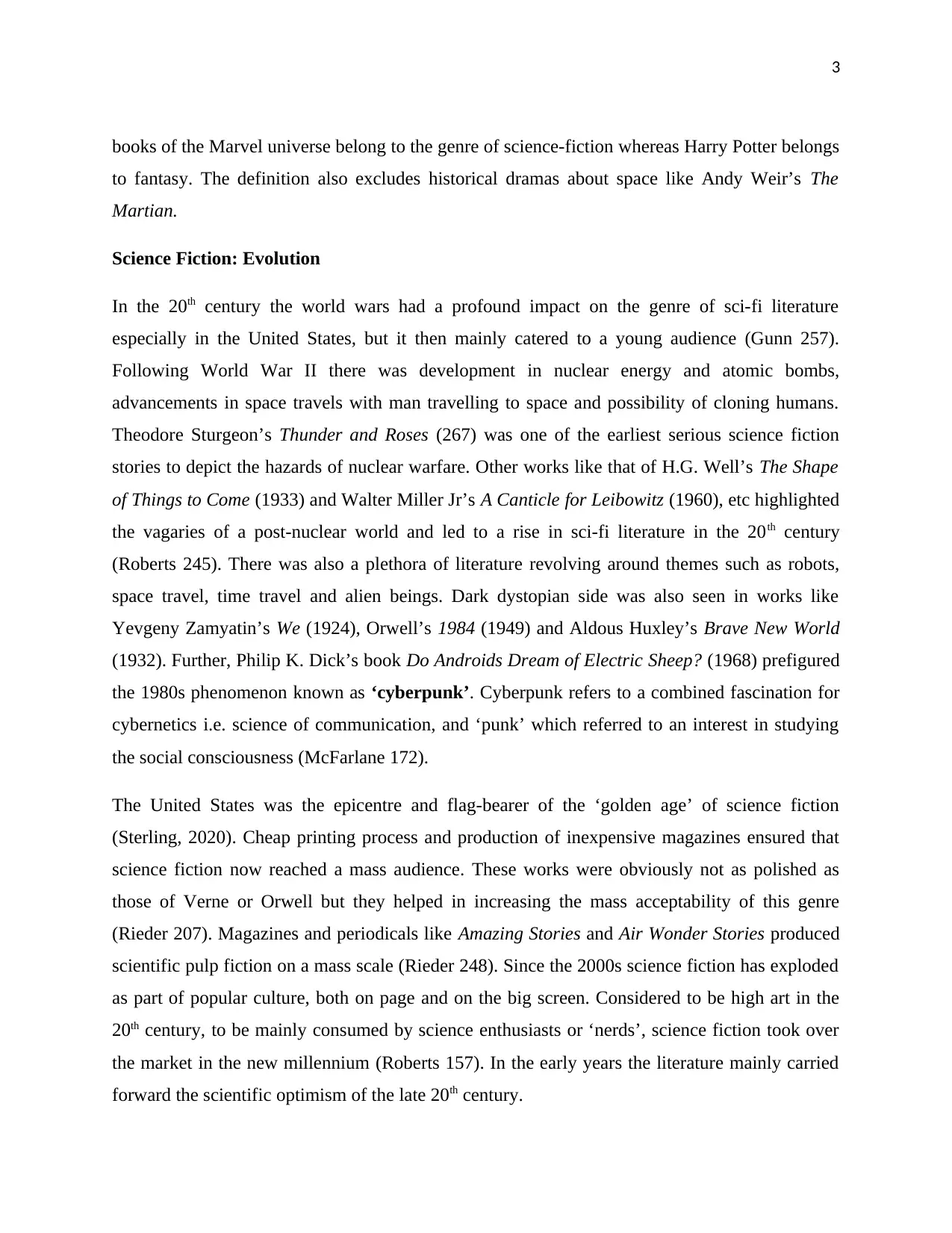
3
books of the Marvel universe belong to the genre of science-fiction whereas Harry Potter belongs
to fantasy. The definition also excludes historical dramas about space like Andy Weir’s The
Martian.
Science Fiction: Evolution
In the 20th century the world wars had a profound impact on the genre of sci-fi literature
especially in the United States, but it then mainly catered to a young audience (Gunn 257).
Following World War II there was development in nuclear energy and atomic bombs,
advancements in space travels with man travelling to space and possibility of cloning humans.
Theodore Sturgeon’s Thunder and Roses (267) was one of the earliest serious science fiction
stories to depict the hazards of nuclear warfare. Other works like that of H.G. Well’s The Shape
of Things to Come (1933) and Walter Miller Jr’s A Canticle for Leibowitz (1960), etc highlighted
the vagaries of a post-nuclear world and led to a rise in sci-fi literature in the 20th century
(Roberts 245). There was also a plethora of literature revolving around themes such as robots,
space travel, time travel and alien beings. Dark dystopian side was also seen in works like
Yevgeny Zamyatin’s We (1924), Orwell’s 1984 (1949) and Aldous Huxley’s Brave New World
(1932). Further, Philip K. Dick’s book Do Androids Dream of Electric Sheep? (1968) prefigured
the 1980s phenomenon known as ‘cyberpunk’. Cyberpunk refers to a combined fascination for
cybernetics i.e. science of communication, and ‘punk’ which referred to an interest in studying
the social consciousness (McFarlane 172).
The United States was the epicentre and flag-bearer of the ‘golden age’ of science fiction
(Sterling, 2020). Cheap printing process and production of inexpensive magazines ensured that
science fiction now reached a mass audience. These works were obviously not as polished as
those of Verne or Orwell but they helped in increasing the mass acceptability of this genre
(Rieder 207). Magazines and periodicals like Amazing Stories and Air Wonder Stories produced
scientific pulp fiction on a mass scale (Rieder 248). Since the 2000s science fiction has exploded
as part of popular culture, both on page and on the big screen. Considered to be high art in the
20th century, to be mainly consumed by science enthusiasts or ‘nerds’, science fiction took over
the market in the new millennium (Roberts 157). In the early years the literature mainly carried
forward the scientific optimism of the late 20th century.
books of the Marvel universe belong to the genre of science-fiction whereas Harry Potter belongs
to fantasy. The definition also excludes historical dramas about space like Andy Weir’s The
Martian.
Science Fiction: Evolution
In the 20th century the world wars had a profound impact on the genre of sci-fi literature
especially in the United States, but it then mainly catered to a young audience (Gunn 257).
Following World War II there was development in nuclear energy and atomic bombs,
advancements in space travels with man travelling to space and possibility of cloning humans.
Theodore Sturgeon’s Thunder and Roses (267) was one of the earliest serious science fiction
stories to depict the hazards of nuclear warfare. Other works like that of H.G. Well’s The Shape
of Things to Come (1933) and Walter Miller Jr’s A Canticle for Leibowitz (1960), etc highlighted
the vagaries of a post-nuclear world and led to a rise in sci-fi literature in the 20th century
(Roberts 245). There was also a plethora of literature revolving around themes such as robots,
space travel, time travel and alien beings. Dark dystopian side was also seen in works like
Yevgeny Zamyatin’s We (1924), Orwell’s 1984 (1949) and Aldous Huxley’s Brave New World
(1932). Further, Philip K. Dick’s book Do Androids Dream of Electric Sheep? (1968) prefigured
the 1980s phenomenon known as ‘cyberpunk’. Cyberpunk refers to a combined fascination for
cybernetics i.e. science of communication, and ‘punk’ which referred to an interest in studying
the social consciousness (McFarlane 172).
The United States was the epicentre and flag-bearer of the ‘golden age’ of science fiction
(Sterling, 2020). Cheap printing process and production of inexpensive magazines ensured that
science fiction now reached a mass audience. These works were obviously not as polished as
those of Verne or Orwell but they helped in increasing the mass acceptability of this genre
(Rieder 207). Magazines and periodicals like Amazing Stories and Air Wonder Stories produced
scientific pulp fiction on a mass scale (Rieder 248). Since the 2000s science fiction has exploded
as part of popular culture, both on page and on the big screen. Considered to be high art in the
20th century, to be mainly consumed by science enthusiasts or ‘nerds’, science fiction took over
the market in the new millennium (Roberts 157). In the early years the literature mainly carried
forward the scientific optimism of the late 20th century.
⊘ This is a preview!⊘
Do you want full access?
Subscribe today to unlock all pages.

Trusted by 1+ million students worldwide

4
However, as global world politics radically altered in the last decade and humans have now come
to somewhat view limitless scientific and technological advancements as future cause for the
planet’s demise, sci-fi literature now reflects this fear and pessimism of its readers. It is now
inclining heavily towards the element of dystopia but the lines between dystopia and utopia are
not clearly defined- a unique feature of 21st century science fiction (Rieder 165). This has been
brilliantly portrayed in Scott Westerfeld’s Uglies (2005) where everyone undergoes a plastic
surgery and trivial social grievances are gone; but there is a dark side to it.
Thus, in the 21st century we see that science fiction has grown to be more than just a literary
genre (Roberts 260). Its followers constitute a unique subculture that is spread worldwide. Today
science-fiction related products are endless, not restricted to novels, short stories or movies.
There are TV shows, comics, computer games, collectibles etc. In fact, every town or city
organizes its own Sci-Fi Convention which is attended by thousands, making these gatherings
booming markets for fast moving consumer goods (FMCG) and other merchandise (Sharma and
Devgan 200). These gatherings are also opportunities for people to share a sense of solidarity and
indulge in exchange of ideas, culture and latest sci-fi news.
An important notion in science fiction literature is that the premise or the basis of life might
change at any time (Sharma and Devgan 205). Today, the earth is rapidly undergoing change due
to industrialization, urbanisation, unchecked population growth, climate change and
unsustainable use of limited resources. As such sci-fi literature in the 21st century is principally
about preventing an event in the future. It also effectively develops the self preventing
prophecy i.e. a prediction that prevents what it predicts from happening (Beukes 213). Roberts
(201) in his book posits that science fiction is extremely important in a society. Science fiction is
the power of liberating imagination (Beukes 157). Imagination is crucial in science fiction, often
more than knowledge, because it is based on the belief that if you can imagine it today you can
create it tomorrow. This is quite true with regard to the concept of robots, Apple tablets (which,
one can say, draws its roots from the book The Hitchhiker’s Guide to Galaxy, 1979) and even
smart-phones (Star Trek).
Secondly, science fiction provides an unbiased view of the future, imposes ethical questions that
need consideration as we continue to move forward and develop new technologies (Roberts,
However, as global world politics radically altered in the last decade and humans have now come
to somewhat view limitless scientific and technological advancements as future cause for the
planet’s demise, sci-fi literature now reflects this fear and pessimism of its readers. It is now
inclining heavily towards the element of dystopia but the lines between dystopia and utopia are
not clearly defined- a unique feature of 21st century science fiction (Rieder 165). This has been
brilliantly portrayed in Scott Westerfeld’s Uglies (2005) where everyone undergoes a plastic
surgery and trivial social grievances are gone; but there is a dark side to it.
Thus, in the 21st century we see that science fiction has grown to be more than just a literary
genre (Roberts 260). Its followers constitute a unique subculture that is spread worldwide. Today
science-fiction related products are endless, not restricted to novels, short stories or movies.
There are TV shows, comics, computer games, collectibles etc. In fact, every town or city
organizes its own Sci-Fi Convention which is attended by thousands, making these gatherings
booming markets for fast moving consumer goods (FMCG) and other merchandise (Sharma and
Devgan 200). These gatherings are also opportunities for people to share a sense of solidarity and
indulge in exchange of ideas, culture and latest sci-fi news.
An important notion in science fiction literature is that the premise or the basis of life might
change at any time (Sharma and Devgan 205). Today, the earth is rapidly undergoing change due
to industrialization, urbanisation, unchecked population growth, climate change and
unsustainable use of limited resources. As such sci-fi literature in the 21st century is principally
about preventing an event in the future. It also effectively develops the self preventing
prophecy i.e. a prediction that prevents what it predicts from happening (Beukes 213). Roberts
(201) in his book posits that science fiction is extremely important in a society. Science fiction is
the power of liberating imagination (Beukes 157). Imagination is crucial in science fiction, often
more than knowledge, because it is based on the belief that if you can imagine it today you can
create it tomorrow. This is quite true with regard to the concept of robots, Apple tablets (which,
one can say, draws its roots from the book The Hitchhiker’s Guide to Galaxy, 1979) and even
smart-phones (Star Trek).
Secondly, science fiction provides an unbiased view of the future, imposes ethical questions that
need consideration as we continue to move forward and develop new technologies (Roberts,
Paraphrase This Document
Need a fresh take? Get an instant paraphrase of this document with our AI Paraphraser
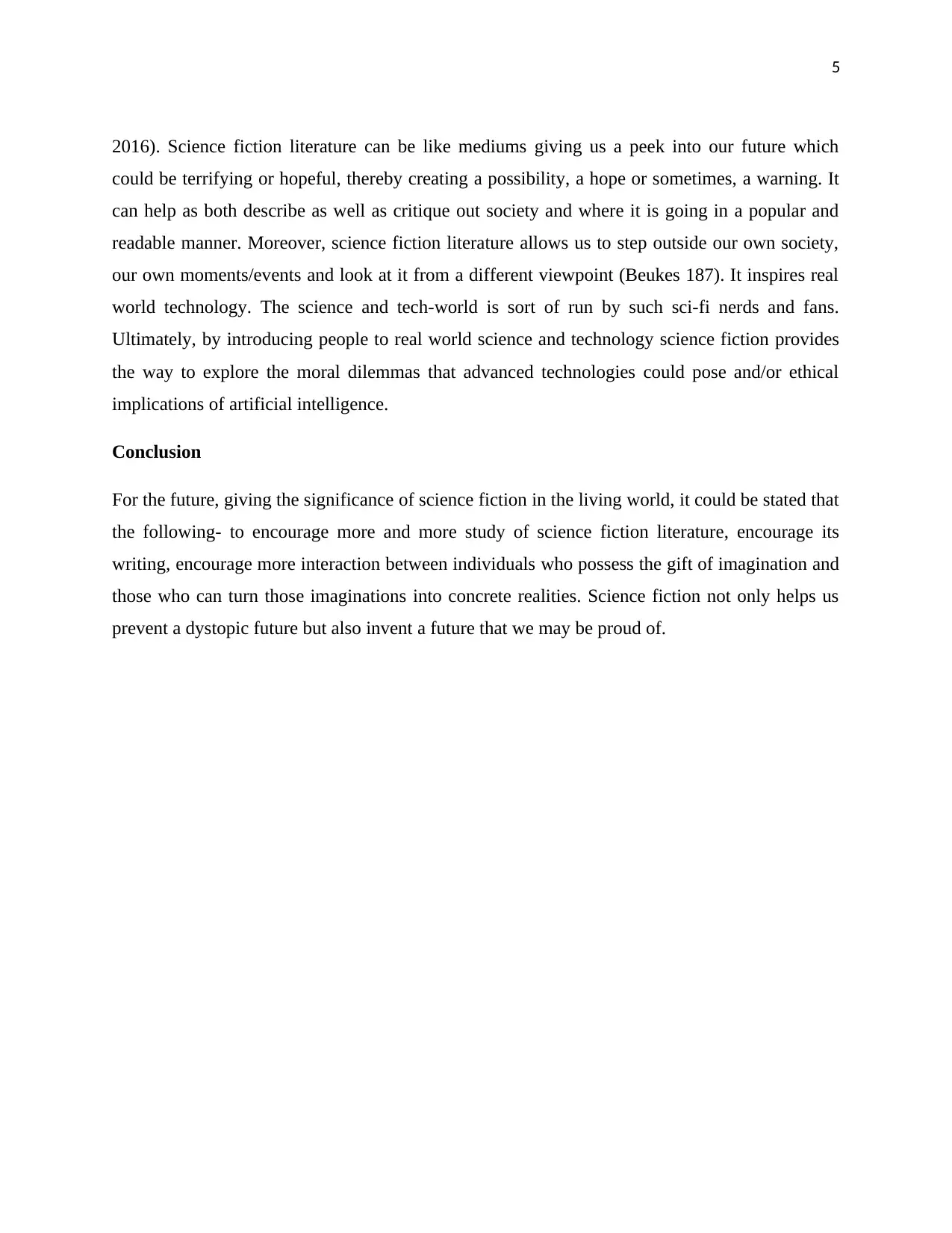
5
2016). Science fiction literature can be like mediums giving us a peek into our future which
could be terrifying or hopeful, thereby creating a possibility, a hope or sometimes, a warning. It
can help as both describe as well as critique out society and where it is going in a popular and
readable manner. Moreover, science fiction literature allows us to step outside our own society,
our own moments/events and look at it from a different viewpoint (Beukes 187). It inspires real
world technology. The science and tech-world is sort of run by such sci-fi nerds and fans.
Ultimately, by introducing people to real world science and technology science fiction provides
the way to explore the moral dilemmas that advanced technologies could pose and/or ethical
implications of artificial intelligence.
Conclusion
For the future, giving the significance of science fiction in the living world, it could be stated that
the following- to encourage more and more study of science fiction literature, encourage its
writing, encourage more interaction between individuals who possess the gift of imagination and
those who can turn those imaginations into concrete realities. Science fiction not only helps us
prevent a dystopic future but also invent a future that we may be proud of.
2016). Science fiction literature can be like mediums giving us a peek into our future which
could be terrifying or hopeful, thereby creating a possibility, a hope or sometimes, a warning. It
can help as both describe as well as critique out society and where it is going in a popular and
readable manner. Moreover, science fiction literature allows us to step outside our own society,
our own moments/events and look at it from a different viewpoint (Beukes 187). It inspires real
world technology. The science and tech-world is sort of run by such sci-fi nerds and fans.
Ultimately, by introducing people to real world science and technology science fiction provides
the way to explore the moral dilemmas that advanced technologies could pose and/or ethical
implications of artificial intelligence.
Conclusion
For the future, giving the significance of science fiction in the living world, it could be stated that
the following- to encourage more and more study of science fiction literature, encourage its
writing, encourage more interaction between individuals who possess the gift of imagination and
those who can turn those imaginations into concrete realities. Science fiction not only helps us
prevent a dystopic future but also invent a future that we may be proud of.
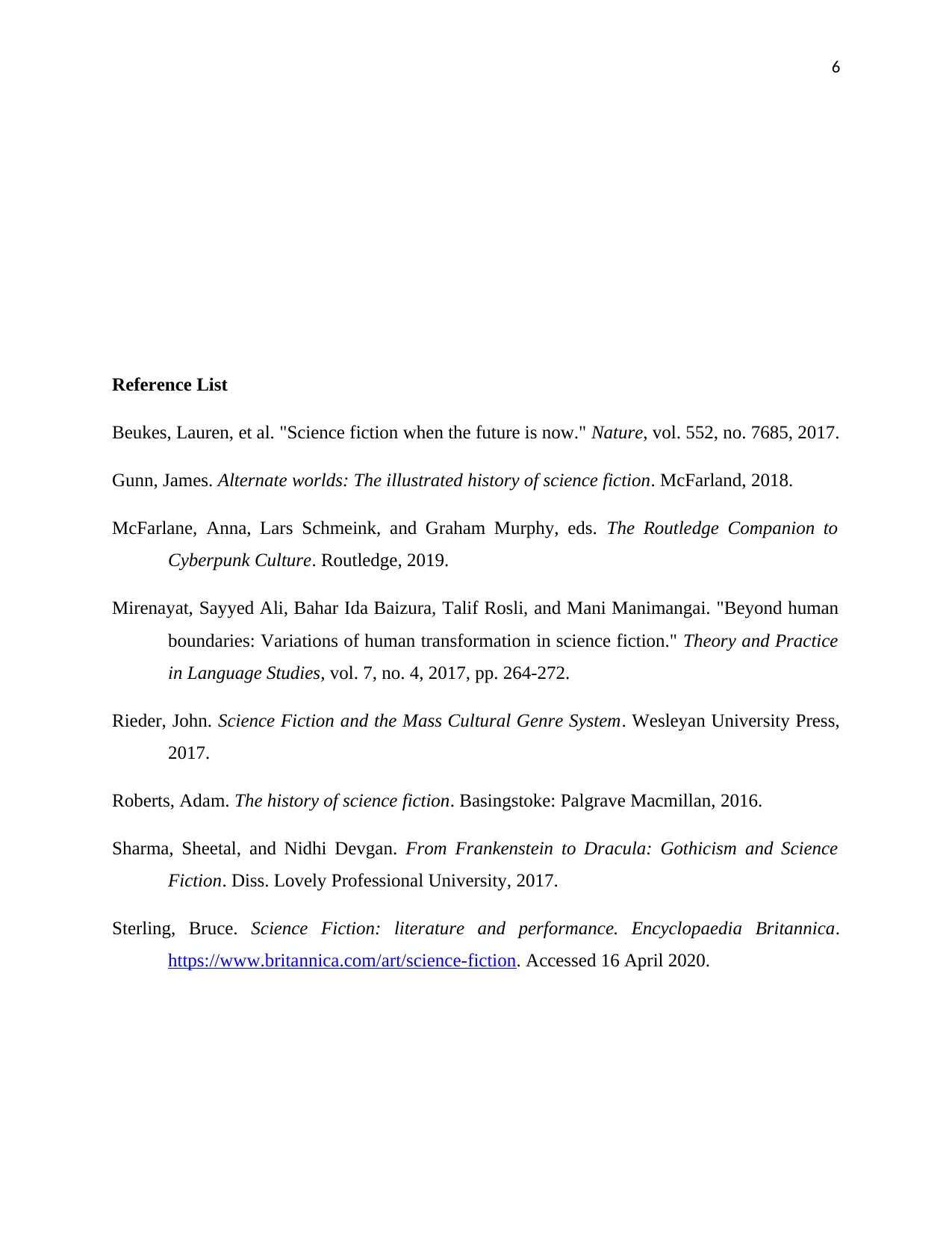
6
Reference List
Beukes, Lauren, et al. "Science fiction when the future is now." Nature, vol. 552, no. 7685, 2017.
Gunn, James. Alternate worlds: The illustrated history of science fiction. McFarland, 2018.
McFarlane, Anna, Lars Schmeink, and Graham Murphy, eds. The Routledge Companion to
Cyberpunk Culture. Routledge, 2019.
Mirenayat, Sayyed Ali, Bahar Ida Baizura, Talif Rosli, and Mani Manimangai. "Beyond human
boundaries: Variations of human transformation in science fiction." Theory and Practice
in Language Studies, vol. 7, no. 4, 2017, pp. 264-272.
Rieder, John. Science Fiction and the Mass Cultural Genre System. Wesleyan University Press,
2017.
Roberts, Adam. The history of science fiction. Basingstoke: Palgrave Macmillan, 2016.
Sharma, Sheetal, and Nidhi Devgan. From Frankenstein to Dracula: Gothicism and Science
Fiction. Diss. Lovely Professional University, 2017.
Sterling, Bruce. Science Fiction: literature and performance. Encyclopaedia Britannica.
https://www.britannica.com/art/science-fiction. Accessed 16 April 2020.
Reference List
Beukes, Lauren, et al. "Science fiction when the future is now." Nature, vol. 552, no. 7685, 2017.
Gunn, James. Alternate worlds: The illustrated history of science fiction. McFarland, 2018.
McFarlane, Anna, Lars Schmeink, and Graham Murphy, eds. The Routledge Companion to
Cyberpunk Culture. Routledge, 2019.
Mirenayat, Sayyed Ali, Bahar Ida Baizura, Talif Rosli, and Mani Manimangai. "Beyond human
boundaries: Variations of human transformation in science fiction." Theory and Practice
in Language Studies, vol. 7, no. 4, 2017, pp. 264-272.
Rieder, John. Science Fiction and the Mass Cultural Genre System. Wesleyan University Press,
2017.
Roberts, Adam. The history of science fiction. Basingstoke: Palgrave Macmillan, 2016.
Sharma, Sheetal, and Nidhi Devgan. From Frankenstein to Dracula: Gothicism and Science
Fiction. Diss. Lovely Professional University, 2017.
Sterling, Bruce. Science Fiction: literature and performance. Encyclopaedia Britannica.
https://www.britannica.com/art/science-fiction. Accessed 16 April 2020.
⊘ This is a preview!⊘
Do you want full access?
Subscribe today to unlock all pages.

Trusted by 1+ million students worldwide
1 out of 6
Your All-in-One AI-Powered Toolkit for Academic Success.
+13062052269
info@desklib.com
Available 24*7 on WhatsApp / Email
![[object Object]](/_next/static/media/star-bottom.7253800d.svg)
Unlock your academic potential
Copyright © 2020–2026 A2Z Services. All Rights Reserved. Developed and managed by ZUCOL.